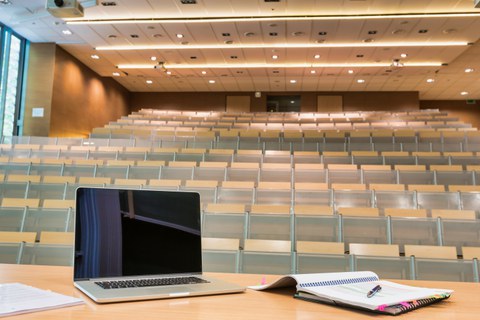Nov 06, 2023; Lecture
10th Diversity Days: Social and sustainable - diversity is the first stepDiverse thinking - perspectives on social sustainability
What research questions do different disciplines discuss around the topic of social sustainability?
In this format, we want to focus on different speakers and their topic-related research. There will be various short presentations that will show the audience the diversity of topics around social sustainability.
The following Get TUgether will be framed by music from Prof. Dr. Stefan E. Schmidt and Dr. Line Nadege Maffeu Nzoda. They perform mucial diversity as a good example of how a fruitful cultural exchange may inspire global unity.
Programme
Rieke Borges, Sabine Marr
How can we live sustainably? Feminist and alternative-economic theses
MultiRural, Leibnitz Institute of Ecological Urban and Regional Development
The lecture shows how closely sustainable housing is linked to social and environmental issues. Feminist and alternative economic perspectives will be used to suggest solutions for sustainable housing. Initial findings from the research project "MehrLand" of the Leibnitz Institute of Ecological Urban and Region al Development (IOER) will be presented.
Dr.in Anna Görner
Global Learning for a Sustainable Future: Focus on Diversity, Ecology and Social Responsibility
CIPSM - Centre for International Postgraduate Studies of Environmental Management
The continuing education programme with a focus on ecological sustainability for decision-makers from the Global South, which CIPSEM runs at the TU Dresden with the support of the German Federal Ministry for the Environment, UNEP and UNESCO, will be presented. Diversity is a core element of the teaching concept. With a focus on diversity, 21 participants from 21 different countries are selected for each course. Through the diversity of regions of origin, professional backgrounds and other facets, participants can train to act in complex contexts when solving environmental challenges. The integration of courses on community engagement, empowerment, gender and governance enables a holistic view of environmental and social sustainability. In this context, we provide insights into course design and formats that aim to promote social sustainability.
Dr.in Rachel Bowden
Education and Sustainability: What's language got to do with it?
Centre for Teacher Education and educational Research
This lecture will present impulses from research and practice in language and sustainability education. Teachers and educators in European universities and schools need to address language ideologies and practices in order to create an "inclusive, quality education for all". This is the only way to enable the necessary transformation of education.
Dr. Manès Weisskircher
Right-wing extremism versus climate protection? Nationalist opposition in a transnational policy field
Right-wing populism and climate policy are two of the most relevant contemporary political phenomena, but they are usually treated separately in the social sciences. The BMBF junior research group REXKLIMA links both topics. In doing so, the project " Right-wing extremism versus climate protection? Nationalist Opposition in a Transnational Political Field " is based at the Institute of Political Science at the TU Dresden and the Hannah Arendt Institute for Research on Totalitarianism and asks the question: How and why do right-wing populist and right-wing extremist parties mobilise around the issue of climate change?
Chair of Social and Healt Care Buildings and Design
Social sustainability on campus - inspiration from architecture students
Chair of Social and Health Care Buildings and Design
Students in the subject "Inclusion in Architecture" were given the task in the exercise "Campus Life" to deal with an inclusive idea that they encounter in everyday life on campus. This could include a wide variety of aspects: a project of the TU Dresden, a structural solution, direct support from people and much more. Additions to the idea of inclusion or a new inclusive solution for the campus could also be developed. In the lecture, a summary of the most interesting contributions of the students will be presented.
Dr.in Maren Hachmeister
Age and digital change. Experiences of older volunteers with voluntarism, age and digitalisation from the post-reunification period to the Corona pandemic (1980-2023)
The research project "Age and digital change. Experiences of older volunteers with voluntarism, age and digitalisation from the post-reunification period to the Corona pandemic (1980-2023)" is dedicated to the digital participation of older people in the field of social engagement and the question of whether and how they can become pioneers and innovators of digital change. From the post-reunification period to the end of the Corona pandemic, volunteers had to reinvent themselves and their engagement several times. These times of biographical transformation will now be researched in more detail over the next three years (2023-2026). The project will use focused narrative and life history interviews to shed light on how older people organise knowledge transfer and innovation digitally and to what extent they use their engagement to free themselves from situations of social isolation. Older people's experiences with voluntarism, age and digital technologies should thus become visible as resources for shaping social engagement and as a contribution to social cohesion as a whole. The project will be located at HAIT in the research field "Transformation Research in an International Comparative Perspective" and inscribes itself in HAIT's digital strategy.
Dagmar Karisch-Gierer
Presentation of the network "The Forestry Women"
The Forestry Women-the Network
It is a sign of the times that more and more women are working in forestry. Nevertheless, they still have a special status in the "green man's world" - if they are visible at all. The association wants to highlight the achievements and activities of women in the forestry and timber industry and make these women visible, both in professional circles and to the non-forestry public. Not only the women themselves benefit from this positive effect, but also our forest and the entire forestry and timber industry. The forestry women network women (and also men who actively support the idea of the association) from all areas of the forestry and timber industry.
Registration:
If you are interested in attending the lecture, please register via the Centre for Continuing Education (to the registration). Once you have registered, we will contact you in good time before the date of the lecture.
Be excited! Visit our event page for all the latest information on planned formats.
We look forward to welcoming you at our events!
- Help us to support you! If you have any accessibility needs, we would be happy to hear from you at .
- You can find the information on data protection in the corresponding information sheet "Privacy policy on the processing of personal data/information obligations according to DSGVO".
- The measures are "Funded by the Federal Ministry of Education and Research (BMBF) and the Free State of Saxony within the framework of the Excellence Strategy of the Federal Government and the Länder".
 © SGDM
© SGDM
Coordinator Diversity Management
NameVivian Weidner M.A.
Send encrypted email via the SecureMail portal (for TUD external users only).
Unit 9.3 Diversity Management
Unit 9.3 Diversity Management
Visiting address:
Verwaltungsgebäude 3, Room 219 Nöthnitzer Str. 43
01187 Dresden

